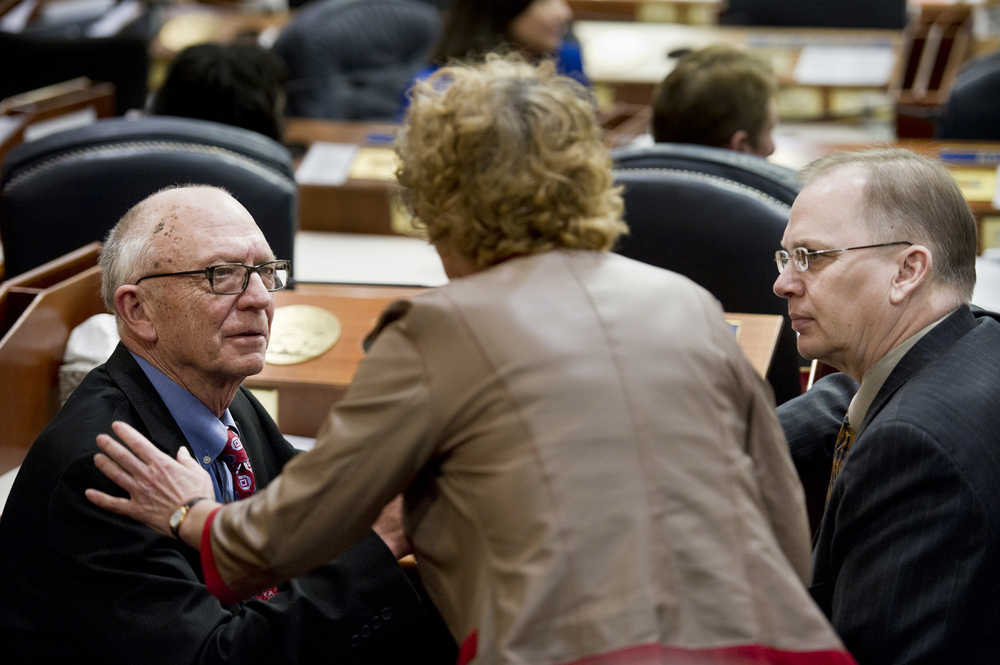In an unprecedented action, the Alaska House of Representatives voted 38-1 Monday to suspend work on all bills not related to the state budget.
House Concurrent Resolution 23, inspired by Rep. Bryce Edgmon, D-Dillingham and a member of the House’s Republican-led majority, “restrict(s) committee meetings of the Alaska House of Representatives to measures that substantially relate to and have as their primary purpose appropriating, raising, or allocating state revenue, until the Alaska House of Representatives passes a state operating budget to the Alaska Senate.”
The resolution takes effect immediately.
“What we’re trying to do is focus it down, take some of the things off our plate by not allowing some legislation to be heard and trying to concentrate on the budget itself,” said Rep. Mike Chenault, R-Nikiski and the Speaker of the House.
The resolution formally suspends several rules in the House, restricting the body’s work and permitting members to reschedule bills on short notice. Rep. Charisse Millett, R-Anchorage and the House Majority Leader, said the House has used similar resolutions before, but never for the budget.
With the state’s annual deficit approaching $4 billion, the situation “calls for extraordinary measures,” said Rep. Craig Johnson, R-Anchorage and chairman of the House Rules committee.
The sole lawmaker to vote against the resolution was Rep. Andy Josephson, D-Anchorage and a member of the House minority. Josephson said he was concerned about a section of the resolution that suspends the requirement for five days’ notice before a bill is heard in a committee. Now, the House is operating under a “24-hour rule” that mandates at least one day’s notice. In practice during past Legislative sessions, hearings have been inserted into the schedule at the end of the previous working day, sometimes resulting in as little as 12 hours’ notice.
Other members of the House, speaking on the floor before the vote, said they were concerned about the suspension of the five-day rule, but it didn’t keep them from voting in favor of the resolution.
Speaking after the vote, Chenault and Johnson said the suspension of the five-day rule was necessary to reschedule things this week. Without its suspension, the House would not have begun its budget focus until next week.
To compensate for the absence of the five-day rule, Chenault and Rep. Les Gara, D-Anchorage, referred to an unwritten “gentleman’s agreement” between the House majority and minority. That agreement calls for the timing issue to be revisited in one week if things don’t progress as envisioned.
“The reality is (the minority) could introduce the same resolution, and if things weren’t going well, I’d be in support of going back,” Rep. Johnson said.
Millett called the resolution a “trust-building exercise,” a sentiment that Rep. Sam Kito III, D-Juneau, said he agrees with.
“I’m cautiously optimistic that there is an effort to work together in good faith and that we will continue to work together with our colleagues on both sides of the aisle for a sustainable budget plan,” he said.
Speaking from the floor, Rep. Cathy Muñoz, R-Juneau, said “this is very important to focusing our work,” and “I really appreciate being able to get all of us … to solve our budget issues.”
Chenault said the bills that get hearings will be those that “either reduce state spending or raise state revenues.” Those include the measures to use Permanent Fund earnings to partially balance the budget, cut oil tax credits, tax increases, the annual budget bills, and a handful of others including prison-reform legislation.
One of the only non-budget items to get a hearing in the House was a measure from Sen. Johnny Ellis, D-Anchorage, which would legally shield Alaskans who administer a counter-overdose injection to a person suffering a heroin or prescription painkiller overdose. The House Judiciary Committee began hearing that bill 20 minutes after the entire House voted on HCR 23.
The House restrictions should be lifted as soon as a budget bill passes from the House and to the Senate, something that has traditionally happened in March.
Monday’s vote is applicable only in the House of Representatives, and on Monday evening, there was no indication that the Senate would follow suit with a similar measure.

